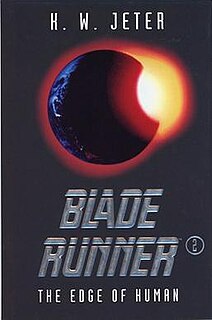
Blade Runner 2: The Edge of Human (1995) is a science fiction novel by American writer K. W. Jeter. It is a continuation of both the film Blade Runner and the novel upon which the film was based, Philip K. Dick's Do Androids Dream of Electric Sheep?
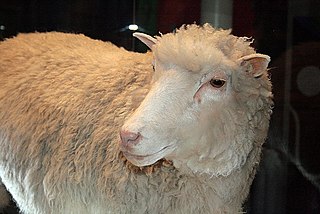
Dolly was a female domestic sheep, and the first mammal cloned from an adult somatic cell, using the process of nuclear transfer.

Do Androids Dream of Electric Sheep? is a science fiction novel by American writer Philip K. Dick, first published in 1968. The novel is set in a post-apocalyptic San Francisco, where Earth's life has been greatly damaged by a nuclear global war. Most animal species are endangered or extinct from extreme radiation poisoning, so that owning an animal is now a sign of status and empathy, an attitude encouraged towards animals. The book served as the primary basis for the 1982 film Blade Runner, and many elements and themes from it were used in its 2017 sequel Blade Runner 2049.

Electric Sheep is a distributed computing project for animating and evolving fractal flames, which are in turn distributed to the networked computers, which display them as a screensaver.
Sheep are quadrupedal, ruminant mammals that are typically kept as livestock.
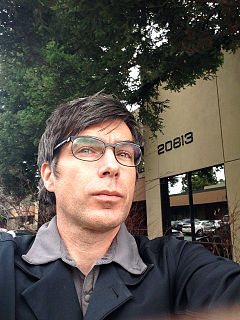
Patrick Sean Farley is a freelance illustrator and Web page designer. Known as a pioneer of webcomics as a medium, Farley works out of Oakland, California.

Scott Draves is the inventor of Fractal Flames and the leader of the distributed computing project Electric Sheep. He also invented patch-based texture synthesis and published the first implementation of this class of algorithms. He is also a video artist and accomplished VJ.
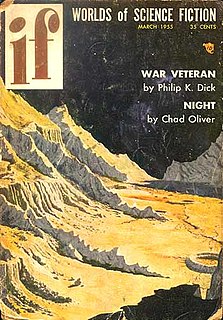
"War Veteran" is a science fiction short story by American writer Philip K. Dick. It was first published in If magazine in March 1955.

Black Sheep Boy is the third studio album by American indie rock band Okkervil River, released on April 5, 2005. The title is inspired by the song "Black Sheep Boy" by 1960s folk singer Tim Hardin. The album deals with Hardin's struggle with heroin addiction and Okkervil River lead singer Will Sheff's failed relationships and heartbreaks. The album cover features the work of Providence artist William Schaff.

Pearl Lake State Park, at the base of Hahn's Peak, is in Routt County, Colorado near the town of Hahn's Peak, Colorado and is north of Steamboat Springs. Pearl Lake is named for M. Pearl Hartt, the wife of pioneer sheep rancher, John Kelly Hartt.

The fat-tailed sheep is a general type of domestic sheep known for their distinctive large tails and hindquarters. Fat-tailed sheep breeds comprise approximately 25% of the world sheep population, and are commonly found in northern parts of Africa, the Middle East, Pakistan, Afghanistan, Iran, North India, Western China, Somaliaand Central Asia.

Science Fiction is the second album by the German indie rock quartet Blackmail. Following up their debut release in 1997, Science Fiction was more openly accepted and liked. It also accumulated quite a large number of fans, which was a beginning of a more solid career for Blackmail.

Broadside Electric is an American folk rock band from Philadelphia. Formed in 1990, and is still active as of July 2017. Audiences expect an erudite and eclectic mix of traditional material, including Child ballads, foreign language songs, and humorous, obscure, and sometimes absurd.

Le Truel is a commune in the Aveyron department in southern France. The village was in the ancient province of Rouergue where they spoke in the rouergat patois of Occitan.

Sheep are quadrupedal, ruminant mammals typically kept as livestock. Like most ruminants, sheep are members of the order Artiodactyla, the even-toed ungulates. Although the name sheep applies to many species in the genus Ovis, in everyday usage it almost always refers to Ovis aries. Numbering a little over one billion, domestic sheep are also the most numerous species of sheep. An adult female is referred to as a ewe, an intact male as a ram, occasionally a tup, a castrated male as a wether, and a young sheep is a lamb.
The In the Flesh Tour, also known as the Animals Tour, was a concert tour by the English rock band Pink Floyd in support of their album Animals. It was divided in two legs, one in Europe and another in North America. The tour featured large inflatable puppets, as well as a pyrotechnic "waterfall", and one of the biggest and most elaborate stages to date, including umbrella-like canopies that would rise from the stage to protect the band from the elements.
Does the Cosmic Shepherd Dream of Electric Tapirs? is an album by the Acid Mothers Temple & The Melting Paraiso U.F.O., released in 2004. The title is a reference to the Philip K. Dick novel, Do Androids Dream of Electric Sheep?.

"Do Shapeshifters Dream of Electric Sheep?" is the fourth episode of the third season of the American science fiction drama television series Fringe, and the 47th episode overall. The first half of the third season alternated entire episodes between the parallel universe and the prime universe. "Do Shapeshifters Dream of Electric Sheep?" took place in the prime universe, and involved several shapeshifters, including Thomas Jerome Newton, who is eventually captured. Meanwhile, Fauxlivia attempts to maintain her cover and minimize the damage.
Do Androids Dream of Electric Sheep? is a 24 issue comic book limited series published by BOOM! Studios in 2009. It is an adaptation of Philip K. Dick's novel by the same name and was drawn by Tony Parker. The series was nominated for an Eisner Award in the category Best New Series.
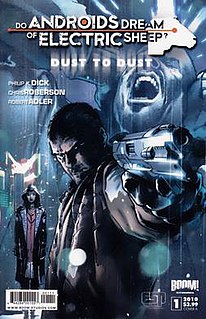
Dust to Dust or Do Androids Dream of Electric Sheep?: Dust to Dust is an 8 issue comic book limited series published by BOOM! Studios in 2010. The series is a prequel to the story of Do Androids Dream of Electric Sheep? The series was written by Chris Roberson and drawn by Robert Adler.














